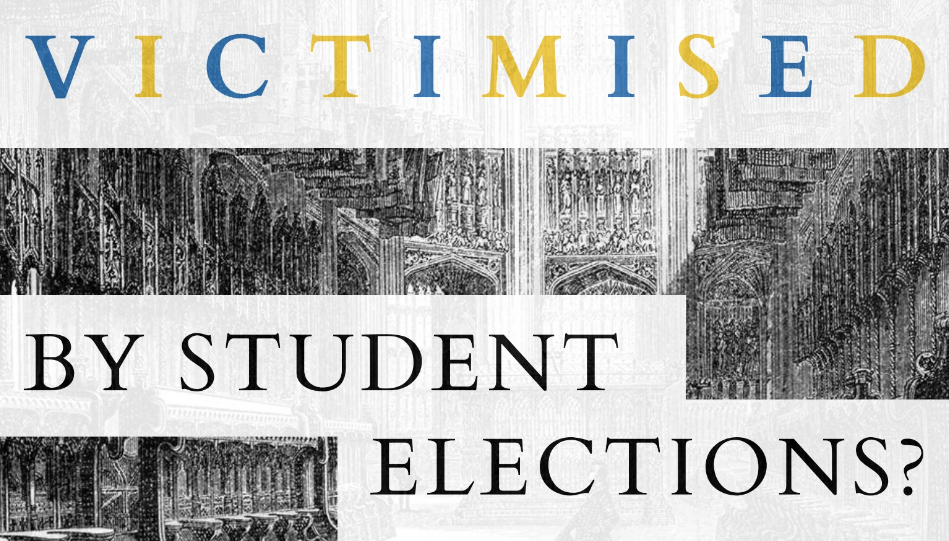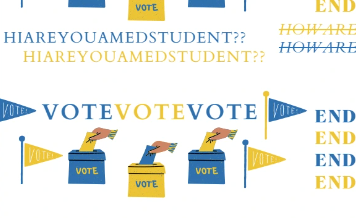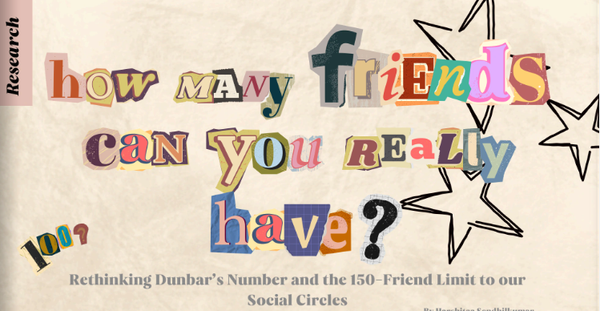Have you or a loved one been personally victimised by student elections?

By Amman Ahmed
The views expressed in this perspectives piece pertain solely to the author
As a student ambassador I have worked at open days, offer holder days and even interviews. One of the main things we preach to potential medical students is the wonder of RUMS as a student body.
“RUMS is unlike any..”
“UCLMS came from the union of..”
“You can connect with older…”
It’s a valid point to make – RUMS has the potential to give medical students a unique voice and space during a very significant period of their lives. Being student-run means that students can directly implement feedback from their own experiences, but also from their peers who may feel more willing to open up about their perspective to someone they can relate to. It’s this capacity for change that motivates people to apply for committee positions and daringly present themselves to the brutal force of social judgement that follows. And when people take up these positions they stick to the ideas that compelled them to run in the first place, right?
As a first-year, elections are a shiny novel thing – they’re very “uni-core” and give you a little dash of flavour as your first year approaches its end. In second year, the charm starts to wear off. More familiar faces are taking up the posters that appear across campus overnight. But the familiarity doesn’t just stop there; rather, it spreads across their manifestos which have odd echoes of the past. “Oh well,” you think, “I’m sure I’m just overthinking it.” You’re not. Third year is where I’m at now, a point of strong disillusionment. The familiarity of the campaign promises are too striking to excuse and instead pose a question of what actually happened over the last year – did anything change? This is the beautiful cycle of election season – just as quickly as the posters are set up, they’re taken back down and the memory fades away over the many months until the new committee arrives.
In fairness, I can’t say for sure that promises aren’t kept. Bureaucracy is a hard force to combat and a lot of improvements are kept under the hood, but I do think we should be more willing to acknowledge the state of progress. While RUMS is student-run, it is also an institution and deserves to be challenged in the same way students have led political dialogue throughout history. It would be silly to equate student elections to countrywide elections, but the mindset of expecting a representative to do what they promised should be common between the two. Reflecting even further from that, there is a deeper point to be made about representation of the student body and how the diversity of our populace gets reduced to an almost monoculture that feeds into and from the election system.
Thankfully for me, the promises are not my biggest issue in elections. That instead lies in the daily experience of existing during election week.
“Are you a medical student?” “Are you part of..”
“Have you voted for me?”

Campaigning is necessary and an expected part of election week, but the single approach that has dominated my experience in the past three years is one with no human touch. I can’t think of a candidate who has approached me or my friends with a “hi” or a “hello”. Sometimes their names are never even said! I think this acceptance for people to abandon basic decency in favour of accumulating votes should be challenged more. There is a strong counter-argument here to just let people have their fun indulging in canvassing if that’s what makes them happy, but the moment you drag other people into your world and don’t bother to say hello, it becomes an issue.
One of my memories of second year election season took place in the silent library of Cruciform. I noticed someone walking along the rows of desks and thought it was quite odd, but left it there. Shortly after, she stood to the side of me and a friend and tapped her shoulder. Presented on her phone was a notes app page asking for… a vote! To soften the blow of systemically interrupting every person studying she offered an assortment of stickers (entirely unrelated to the society she was running in). We declined her request.
An anonymous associate has experienced multiple instances of people messaging them after years of silence, asking for a vote. While deprived of context (not that much needs to be given), this is undoubtedly a sad way to use a relationship. If you’re willing to seek someone out and ask them to vote for you, why not reach out to them beyond that single week of the academic year? This superficiality relates directly with the mindset that predicates election season, where some people are just in it to check a box and add something to LinkedIn. Is that really the point of any of this?
You can like election season and be a good person. I can dislike election season and be a good(ish) person. We can all coexist somewhat happily. But what I wanted to say with this article is that people have accepted quite an odd culture where saying hello and your name isn’t necessary when literally pitching yourself as that person’s representative. An easy out for people like me would be abstaining from voting and ignoring it entirely, but then we’re playing our role in the cycle by removing a set of voices that are never represented anyway. So while it may be easy in the moment, the lasting consequences don’t feel so good on the soul.
If you choose to fill in that SU form next year and put yourself forward, I hope you consider tweaking your approach ever so slightly. Say hello, ask me how I’m doing and then tell me all the promises you’re going to keep – that’s all.




